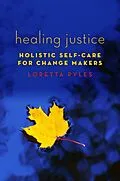In the context of multiple forms of global economic, social, and cultural oppression, along with intergenerational trauma, burnout, and public services retrenchment, this book offers a framework and set of inquiries and practices for social workers, activists, community organizers, counselors, and other helping professionals. Healing justice, a term that has emerged in social movements in the last decade, is taught as a practice of connecting to the whole self, what many are conditioned to ignore -- the body, mind-heart, spirit, community, and natural world. Drawing from the East-West modalities of mindfulness, yoga, and Ayurveda, the author introduces six capabilities -- mindfulness and compassion; critical thinking and curiosity; and effort and equanimity -- which can guide practitioners on a transformative and empowering journey that can ultimately make them and their colleagues more effective in their work. Using case studies, critical analysis, and skill sharing, self-care is presented as an act of resistance to disconnection, marginalization, and internalized oppression. Healing justice is a trauma-informed practice that empowers social practitioners to cultivate the conditions that might allow them to feel more connected to themselves, their clients, colleagues, and communities. The book also engages critically with self-care practices, including investigation into the science of mindfulness, cultural appropriation, and the commodification of self-care. The message is clear that mindfulness-based practices are not a panacea for personal, inter-personal, or political problems. But, they can put practitioners in a more authentic and powerful place to work from, which is particularly important in a world where there is more connection to technology, ideologies, and people who share one's beliefs, and less connection to the natural world, people who are different, and the parts of oneself that one tends to reject. The book also offers suggestions for how to share self-care practices with community members who have less access to wellness.
Autorentext
Loretta Pyles, PhD, RYT-500, is Professor at the School of Social Welfare at the State University of New York at Albany. She is the co-editor of Holistic Engagement: Transformative Social Work Education in the 21st Century and author of Progressive Community Organizing: Reflective Practice in a Globalizing World (2nd ed.). She is a Kripalu certified yoga instructor as well as a practitioner and teacher of mindfulness.
Inhalt
Introduction Part I: Healing Justice and Whole Self-Care Chapter 1. Oppression, Trauma, and Healing Justice Chapter 2. Stress and the Self-Care Revolution Chapter 3. The Whole Self Chapter 4. A Skillful Path of Healing Justice Part II: Holistic Self-Care Practices and Skills Chapter 5. Connecting to the Body Chapter 6. Befriending the Mind-Heart Chapter 7. Rediscovering Spirit Chapter 8. In the Fabric of Community Chapter 9. Cultivating Connections between Person and Planet Part III: Where the Rubber Meets the Road Chapter 10. The Healing Justice Organization Chapter 11. Healing Justice on the Frontlines Chapter 12. Widening the Circle and Coming Home Notes Index
